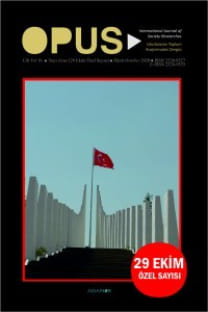Türkiye’de Sağlık Turizmi Pazarlamasının Değerlendirilmesi
Bu çalışmanın amacı termal turizme yönelik hizmet veren termal otel işletmelerinin pazarlama karması elemanlarını (hizmet, fiyatlandırma, dağıtım, tutundurma) nasıl uyguladıkları ve değerlendirdikleri tespit etmektir. Araştırma için 05.03.2018 tarihinde etik kurul izni alındıktan sonra T.C. Kültür ve Turizm Bakanlığı’ndan turizm işletme belgesi almış termal otel ve termal müstakil apart otel olarak nitelendirilen işletmelerin pazarlama/satın alma birimlerinin üst-orta düzey ya da ekip elemanı olarak görev yapan birer kişiye anket formu uygulanmıştır. Toplam 77 termal müstakil apart otel ve termal otelden, 71 adet kullanılabilir anket formu elde edilmiştir. Araştırma sonucuna göre termal otel işletmelerine gelen müşterilerin %53,5’i bireysel olarak gelmektedir. Müşterilerin %60,6’sı işletmeyi dinlenme için tercih etmektedir. Yöneticiler için işletmenin devamlılığını sağlamak ve müşteri memnuniyetini en üst seviyeye çıkarmak en önemli pazarlama hedeflerindendir. Termal otel işletmeleri tutundurma araçlarından kişisel satış ve halkla ilişkileri en etkin şekilde kullandıkları görülmüştür. Termal turizm bir ülkenin ekonomisine ve turizm çeşitliliğine katkı sağlayan önemli bir alandır. Bu noktada termal turizme beklenen katkıyı sağlayabilmek adına ilgili kurumların pazarlama faaliyetleri önemli olacaktır
Assessment of Health Tourism Marketing in Turkey
The aim of this study is to determine how the thermal hotels that provide services for thermaltourism apply and evaluate the marketing mix elements (product, price, place, promotion).Afterreceiving the ethical approval for the research on 05.03.2018, a questionnaire has been applied tomid-level, senior level managers or team members of each Thermal Hotel that received the TourismOperation License from the Ministry of Culture and Tourism in Turkey. A total of 71 surveyforms were obtained from 77 apart thermal hotels and thermal hotels holding operating certificate.According to the results, 53.5% of the customers choose thermal hotels individually. 60.6% ofcustomers prefer to rest in the hotel. The important marketing objectives for the managers werefound as; to ensure the continuity of the enterprise and maximize customer satisfaction. Thermalhotels use personal sales and public relations most effectively as promotion tools. Thermal tourismis an important type of tourism in terms of contributing to the country’s economy and increasingtourism diversity. At this point, the marketing activities applied by the organizations are of greatimportance in terms of ensuring the expected contribution of thermal tourism.
___
- American Marketing Association (2017). Accessed on 4th October 2018 from https://www.ama.org/the-definition-of-marketing-what-is-marketing/
- American Marketing Association (2017). Accessed on 14th November 2018 from https://marketing-dictionary.org/s/services/ Price
- Armstrong, G. and Kotler, P. (2015). Products, services and brands building customer score. Marketing an introduction. 20 th ed. England. Pearson Education Limited.
- Arunmazhi, T and Panneerselvam A. (2013). Types of tourism in India. International Journal of Current Research and Academiz Rewiev, 1(1), 84-88.
- Avcıkurt, C., Giritlioğlu, İ. and Şahin, S. (2011). An evaluation of thermal hotel websites and the use/non-use of the ınternet as a marketing tool by thermal hotels in Turkey. African Journal of Business Management, 5, 2817-2827.
- Booms, B. H. and Bitner, M. J. (1981). Marketing strategies and organization structures for service firms. In: Donnely JH, George WR, eds. Marketing of Services.1 th ed. Chicago: American Marketing Association.
- Connell, C. (2006). Medical tourism: Sea, sun, sand and surgery. Tourism Management, 27, 1093-1100.
- Cornalia, E. T. and Turtureanu, A. (2008). Types and forms of tourism. Acta Universitatis Danubius, Economia, 4(1), 92-103.
- Çiçek, R. and Avderen, S. (2013). Healthy tourism and spa and thermal facilities in central anatolia: A research on determining the current structure and potentials. Karamanoğlu Mehmetbey Üniversitesi Sosyal ve Ekonomı̇k Araştırmalar Dergı̇si, 15, 25-35.
- Gonzales A, Brenzel L and Sancho J. (2001). Health tourism and related services: caribbean development and ınternational trade. Final report.
- Heung, V. C. S., Küçükusta, D. and Song, H. (2010). A conceptual model of medical tourism: Implications for future research. Journal of Travel & Tourism Marketing, 27, 236–251.
- İlker, G. (2012). The marketing mix elements in accomodation enterprises serving termal tourism in Turkey: A sample field study. (Doctoral thesis). Selçuk University, Institute of Social Sciences, Department of Business Administration, Konya.
- Kotan, N. (2018). Destination marketing and thermal tourism as an alternative tourist product: The case of Erzurum. (Master thesis). Erciyes University, Institute of Social Sciences, Department of Tourism Management, Kayseri.
- Kotler, P. and Keller, K. L. (2016). Introduction to marketing management. A framework for marketing. 6th ed. England. Pearson Education Limited.
- Perreault, W.D. and McCarthy, E. J. (1964). Basic marketing: A managerial approach. The United States, Mc Graw-Hill.
- Republic of Turkey Ministry Culture and Tourism (2018). Accessed of 18th September 2018 from http://yigm.kulturturizm.gov.tr/TR,11475/genel-tanimlar.html
- Republic of Turkey Ministry of Health Tourism Department (2020). Accessed of 26th February 2020 from https://saglikturizmi.saglik.gov.tr/
- Yalçınkaya, Z. (2014). A research for role of City Trademark Image in Thermal Tourism Marketing and Instance of Kütahya. (Master thesis). Dumlupınar University, Institute of Social Sciences, Department of Business Administration, Kütahya.
- ISSN: 2528-9527
- Yayın Aralığı: Aylık
- Yayıncı: ADAMOR Toplum Araştırmaları Merkezi
